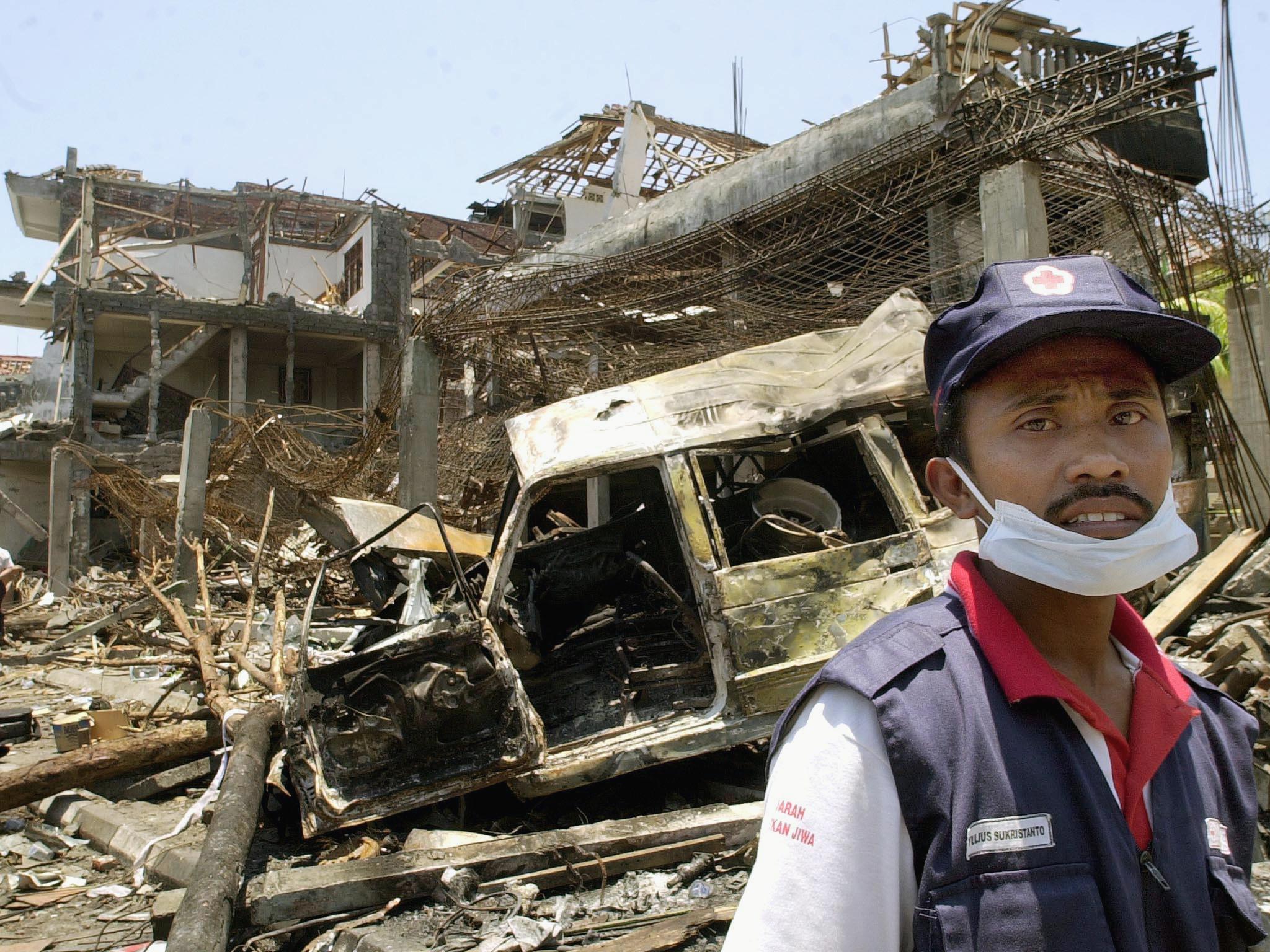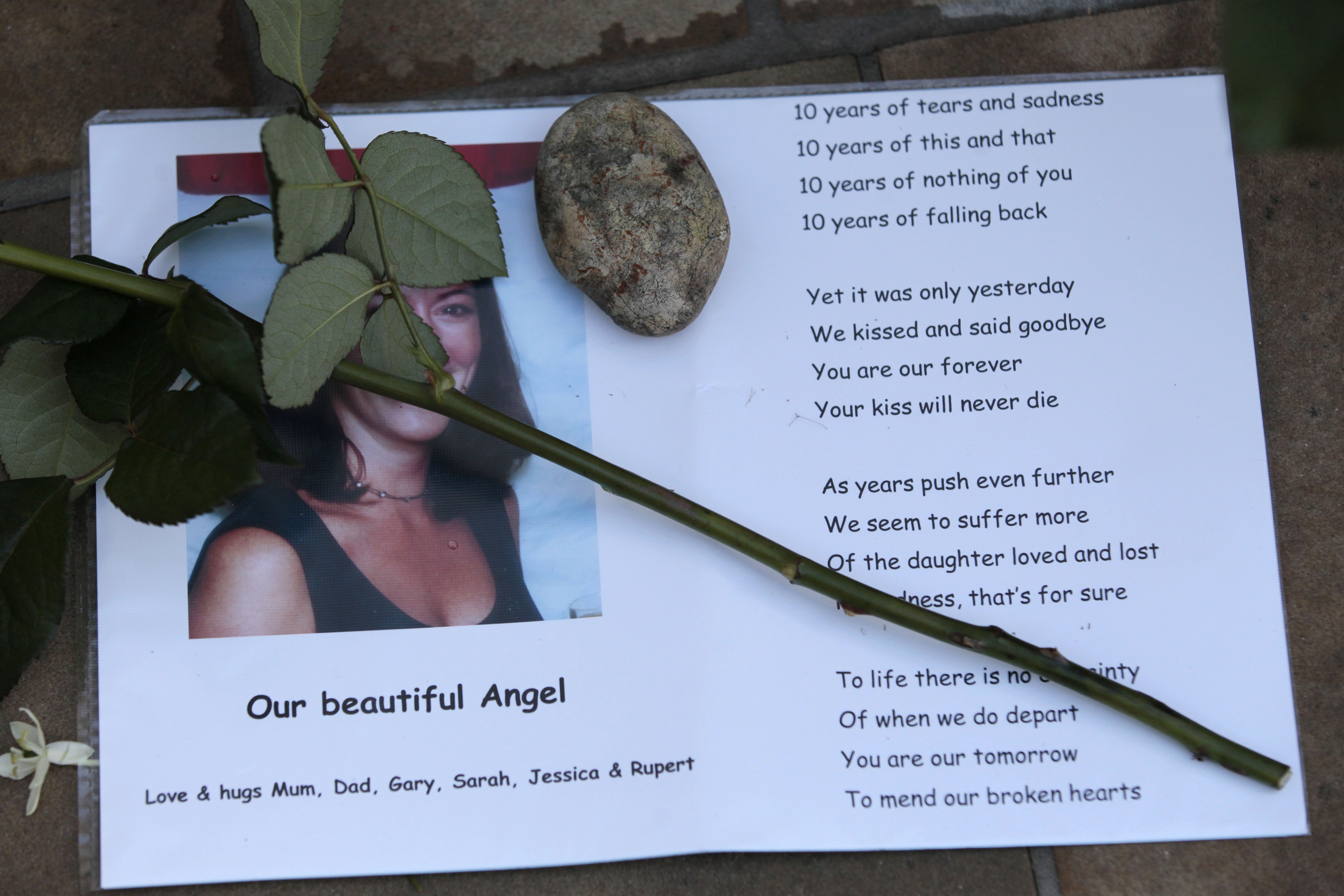“It’s easier to mix and make bomb ingredients than soto,” says Joko Tri Harmanto. The 42-year-old, who also goes by the alias Jack Harun, is seasoning a bowl of soto, a traditional Indonesian soup thick with spices. If it weren’t for his grim joke, you might never suspect you were talking to the man who claims to have helped build the bombs that killed more than 200 people.
In October 2002, three explosions ripped through Bali’s tourist hotspot of Kuta. The first, carried by a suicide bomber outside the popular Paddy’s Pub, is believed to have weighed just 1kg. Seconds later, a car bomb thought to have weighed anywhere between 50 and 150kg detonated outside a nightclub across the street. The damage was catastrophic. Within minutes, a third bomb had gone off outside the United States Consulate. All told, the attacks left at least 202 people dead and a further 209 injured.
Jemaah Islamiyah, a terrorist group founded by Muslim cleric Abu Bakar Ba’asyir and affiliated with Al Qaeda, became the main suspect in the explosions. Dozens of its members who were believed to be involved were arrested. Others went into hiding – that is, until the next bombing in front of Australian Embassy in Jakarta two years later. This time, more Jemaah Islamiyah members were hunted down and brought in – including Joko.

Jack Harun, as he now prefers to be known, started out as an activist for the Islamic Movement in Solo City in Central Java. Jack was known to be a follower of Malaysian terror financier Noordin Mohammad Top, at that time the most hunted terrorist in Indonesia. By his own admission, Jack also helped prepare the bombs used in the first Bali bombing. For sheltering terrorists, Jack was sentenced to six years in prison. He was released on parole at the end of 2008.
Since his release, Jack says, he is a changed man. For him, jihad doesn’t mean carrying out bombings and daring to die in the name of holy war. Now, jihad means daring to live – and to make his life, and the lives of his family, better.
For the last three years, Jack has run his soto restaurant in Manang District in Sukoharjo Regency in Central Java. He told Southeast Asia Globe that he chose cooking as a career as his way to blend in with the community despite the stigma that follows him as an ex-terrorist convict.
On the first Friday of every month, Jack gives away his soto for free. And it works. Customers who were initially hesitant have come from all over to try his soup. Eventually, he assures us, they become regular customers and always come back another day. Now, he says, he sells at least 300 bowls every day.
“There was a process of self-awareness – either they regretted their actions or not”
Correctional centre community advisor Kristin Yuniastuti
Jack’s apparent rehabilitation is testament to the help that he, and other former convicted terrorists like him, have received from Indonesia’s National Counterterrorism Agency (BNPT). The BNPT gives money to serve as a stimulant for former jihadis to build their business and set them on a more secure financial footing.
Thayep Malik, a researcher from Yayasan Prasasti Perdamaian, a Jakarta-based think-tank focusing on countering political violence, said that finding the right trade was essential for reintegrating former extremists.
“What Joko Tri Harmanto does is a form of effort for social reintegration, returning to the society, he said. “The way he’s chosen is selling soto – this is enough to change the stigma that an ex-terrorist convicts are anti-social and don’t want to associate with the society.”
BNPT director for protection Brigjen Pol Herwan Chaidir said that of the more than 1,500 terrorists arrested, two-thirds found their way back into society – but more than 400 went back to their terror cells. He said that financial security was crucial in preventing former radicals from reconnecting with their terror groups.
“We have to quickly lift their economic status – their business spirit must be built, and we must ensure that the government supports them [in their rehabilitation],” he said.

Correctional centre community advisor Kristin Yuniastuti, who accompanied Jack during his parole period, told Southeast Asia Globe that she has seen in Jack a strong determination to re-enter society.
“He was very proactive and always took the initiative to come to the correctional centre – and NGOs partnered with the correctional centre – by himself,” she said.
Kristin has accompanied people convicted of terrorism throughout their parole process since 2012. Her first client, Bahrun Naim, is widely believed to have been the leader of the global Islamic State terror group’s Indonesian chapter. Since then, she has encouraged dozens of convicted terrorists to reintegrate into society. While every deradicalisation process is different, she said, self-awareness was a fundamental part of every ex-jihadi’s journey.
“Whether they will return to [Indonesia] or return to the terrorist cells actually has been seen since the first week of the interrogation after their arrest,” she said. “There was a process of self-awareness – either they regretted their actions or not.”
“Jihad is believed by Jemaah Islamiyah members to have two choices: a glorious life or dying with dignity”
Al Chaidar, a terrorism expert from Aceh’s Malikussaleh University
The days he spent in prison are not a time Jack Harun wants to remember. Being kept apart from his wife, his children and his parents was agony. He felt guilty for neglecting his family and forcing his wife to struggle to earn money not just for their kids but to take care of his parents. After he was released from custody, he resolved never to go back to his terrorist ways, choosing instead to protect and support his family through their hardship.
As an experienced ex-terrorist, some terror networks offered to welcome him back to the fold, but Jack refused. For his family’s sake, he couldn’t be arrested a second time.
“We focus on our families,” he said. “On fulfilling my responsibility as a husband, as a father, and also as a son to my parents. I also want to focus on our financial future, because economic factors remain the dominant factor next to the ideology and belief.”

Jack also started a foundation, Gema Salam, that helps former terrorists who want to return to the government or fit back in with the community. Already, the organisation has 40 members – and the government that they used to fight against has now become their partner.
Yusuf Adirima, who was convicted as part of the Sri Rejeki terror group accused of making home-made bombs in Semarang in 2004, is just one of the former jihadis to have joined Jack’s group.
“We need support to go away from our terrorist networks and come back to the society,” he told Southeast Asia Globe. “Our colleagues in this foundation support each other and help those who want to stop being terrorists.”
It isn’t easy. By turning their backs on their networks, former fundamentalists often receive threats from other terrorist cells, who declare the shedding of their blood lawful. And negative stigma in their new community makes their position equally precarious. For these reasons, the support of fellow ex-members of terrorist networks is very important.
“There are ways that are only known by someone who has experienced it themselves – how to ask them to stop, and what words will be able to touch them,” Yusuf said.
Words aside, the success of deradicalisation is still largely influenced by the environment. For Jack, the amateurish and indiscriminate attacks carried out by current terror cells goes against his basic principles of jihad.
Al Chaidar, a terrorism expert from Aceh’s Malikussaleh University, pointed to the recent trend of familial suicide bombing carried out by a Islamic State-aligned terror network Jamaah Ansharut Daulah. These attacks are generally carried out with low-explosive bombs in a public space – often with many Muslims around. Often, the bombs injure and kill the carrier itself, not subjects or the targets at all.
“Jihad is believed by Jemaah Islamiyah members to have two choices: a glorious life or dying with dignity,” Al Chaidar said. “But the latest bombings by these new terrorist cells turned to be a personal disaster, killing the family itself and leaving the children behind to suffer.”
For Jack, jihad is no longer about his death – dignified or not. As he spoons soto into a bowl, he looks like a man who still has everything to live for.


